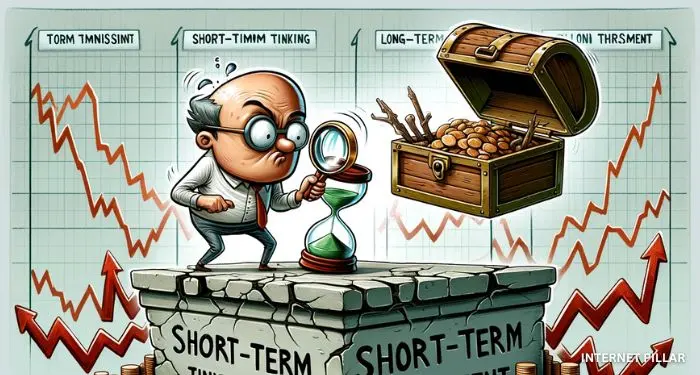Investing is an essential skill for growing wealth but it’s easy to make mistakes when you are a beginner.
Investing involves buying assets like stocks, mutual funds or real estate and hoping they will increase in value.
Many new investors jump in without learning the basics or doing research often chasing quick high profits only to find it’s not that simple.
Even seasoned investors can make errors as there’s no guaranteed formula for success.
Common blunders include not having a long-term plan, letting emotions drive decisions and not diversifying investments.

Some folks also get too attached to a stock for the wrong reasons or try to perfectly time the market. It is important to understand that starting without a strategy can be costly.
Financial education and understanding the basics of investing are vital before diving in. Remember everyone keeps learning throughout their investing journey.
Knowing you’re still learning helps avoid costly preventable mistakes.
Let’s dive in.
17 Common Investing Mistakes and How to Avoid Them
1. Not doing proper Research
Investors often make the mistake of not doing enough research before investing.
It’s important to understand what you’re investing in its risks returns and how it fits your financial goals.

Good research professional advice and avoiding herd mentality are essential. Be wary of trends and hype in the market.
Don’t just follow popular opinion or hot stock tips without doing your homework.
2. Ignoring Risk Management
Overlooking risk management can lead to big financial losses.
Knowing and managing investment risks are key.
This means considering things like market volatility how easy it is to sell the investment (liquidity) and the creditworthiness of the investment.
Using strategies like diversification asset allocation and risk management tools can help control these risks.
3. Not Diversifying
A common error is not diversifying investments.
This can expose your portfolio to too much risk. Diversification means spreading your investments across different types of assets industries and places.
This approach can reduce risk and might improve returns.
You should target for a balanced mix of investments i.e. about 10 – 15 different stocks in various sectors is a good range with no more than 5-10% of your total investment in any one of them.
Both ETF and mutual fund portfolios should cover all major areas.
4. Focusing on the Short Term
Many investors think too short-term and lose track of their long-term goals.
This short-term focus can lead to poor decisions and outcomes. It’s better to have a long-term approach focusing on consistent saving and disciplined investing.
Stock market success takes time and patience. Set realistic expectations and be ready for market ups and downs.

Don’t put all your savings in stocks as recovery from losses can take time. Remember the market’s average return can vary so be prepared for its volatility.
5. Investing Without Financial Stability
Before diving into stocks ensure you’re financially stable. Stock trading has ups and downs and during tough times like bear markets you might lose money.
Always have emergency funds for such periods. Don’t invest if you’re dealing with high-interest debt.
Stock returns aren’t guaranteed and losing money could worsen your debt situation.
Also keep savings for unexpected expenses like medical bills or house repairs especially when the stock market is down.
6. Investing in Unfamiliar Industries
While diversifying your portfolio across industries is smart stick to sectors you understand.
Knowing an industry well helps you grasp what makes a business successful and when it’s likely to grow.
Avoid getting too attached to any stock. Remember you invested to make money.
If the reasons you bought a stock change be ready to sell.
7. Overlooking Transaction Fees
New investors often forget about transaction costs and taxes. Frequent trading can reduce profits due to high commissions. Keep these fees below 2% of the trade.
For instance a $5 commission on a $100 trade means you need a 5% gain just to break even.
Consider long-term investments as they’re usually more beginner-friendly and can yield good returns with less risk and cost.

High fees and expenses can significantly impact your returns over time so opt for low-cost options like index funds or Exchange Traded Funds (ETFs).
8. Not Regularly Reviewing Portfolio Performance
Many new investors fail to regularly assess their portfolios. Regular evaluation helps refine your strategy and understand what’s working.
Even with a buy-and-hold approach you can’t just set it and forget it. Keep an eye on quarterly reports company news sales growth and new product releases.
If your stock portfolio isn’t performing as well as an index fund consider reallocating your investments.
Regular reviews help align your portfolio with your goals and adjust to market and economic changes.
9. Buying High and Selling Low
Many investors fall into the trap of buying high and selling low driven by fear or greed.
They often chase short-term returns or follow investment fads leading to buying at peak prices.
Investments should be based on long-term goals not recent trends. Once an investment is popular it’s harder to determine its true value.
10. Unclear Investment Goals
Not having clear investment goals is a major issue.
Your investment strategy portfolio design and choice of securities should all align with your long-term objectives.

Focusing on current fads or short-term returns can lead you away from achieving your long-term financial goals.
11. Focusing too much on Taxes
While taxes are important they shouldn’t be the main driver of investment decisions.
Tax-loss harvesting can enhance returns but the primary reason for buying or selling a security should be its investment merit.
Decisions based solely on tax implications might not be the best for your portfolio.
12. Emotional Decision-Making
Investing can be emotionally challenging raising questions about involving family in financial planning or estate distribution.
It’s normal for emotions like fear and greed to influence decisions. However recognizing and managing these emotions is important.
A good advisor can help create a plan that works regardless of these emotional considerations.
Avoid letting emotions lead to hasty decisions.
13. Trying to time Market
Market timing is extremely difficult and often detrimental for non-experts.
Missing key trading days can significantly lower returns.
For instance being out of the market on the top 10 trading days from 1993 to 2013 would reduce annualized returns from 9.2% to 5.4%.

Consistent participation in the market rather than attempting to time it generally yields better long-term results.
14. Choosing the Right Adviser
The importance of working with a suitable investment adviser can’t be overstated.
A good adviser aligns with your investment philosophy and life outlook.
Taking time to find the right adviser ensures that your investment strategy and goals are well understood and supported.
15. Ignoring Inflation
Many investors overlook the impact of inflation on their returns.
Focusing on nominal rather than real returns (after adjusting for inflation and fees) can be misleading. Even during low inflation periods costs rise.
Understanding the real value of your assets considering inflation is essential for accurate investment assessment.
16. Media Influence on Investment Decisions
Relying solely on media for investment decisions is risky.
News channels often present information that is already factored into market prices.
Successful investors use multiple independent sources and conduct their own research.
It’s important to discern valuable information from the noise and focus on long-term strategies rather than short-term media-driven fears.
17. Neglecting to start or continue
Many people delay or stop investing due to a lack of knowledge or past investment setbacks.
Starting and maintaining an investment strategy requires ongoing effort and analysis.

Understanding the basics and remaining active and informed in your investment choices are key to long-term success.
I hope this article will be helpful in finding some of the investment mistakes in your portfolio and avoiding them.